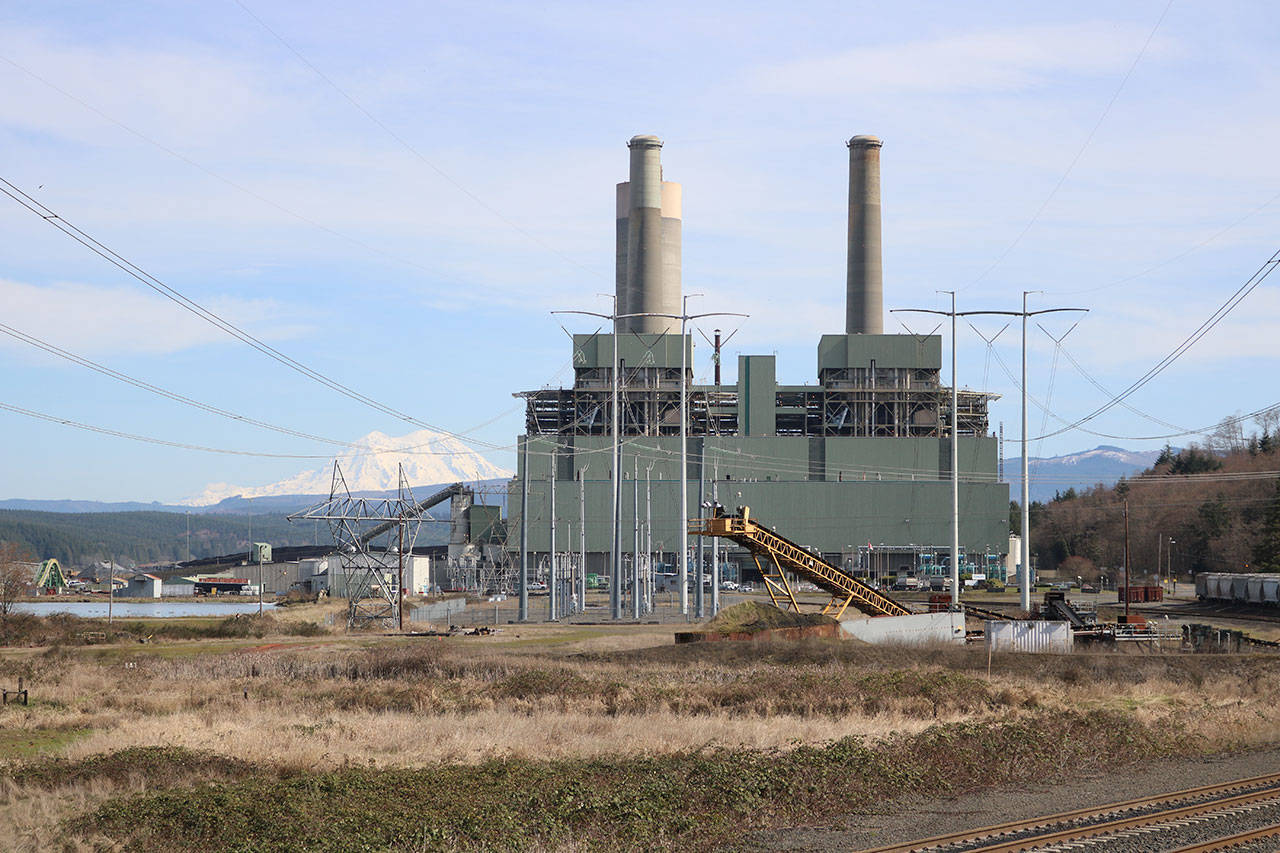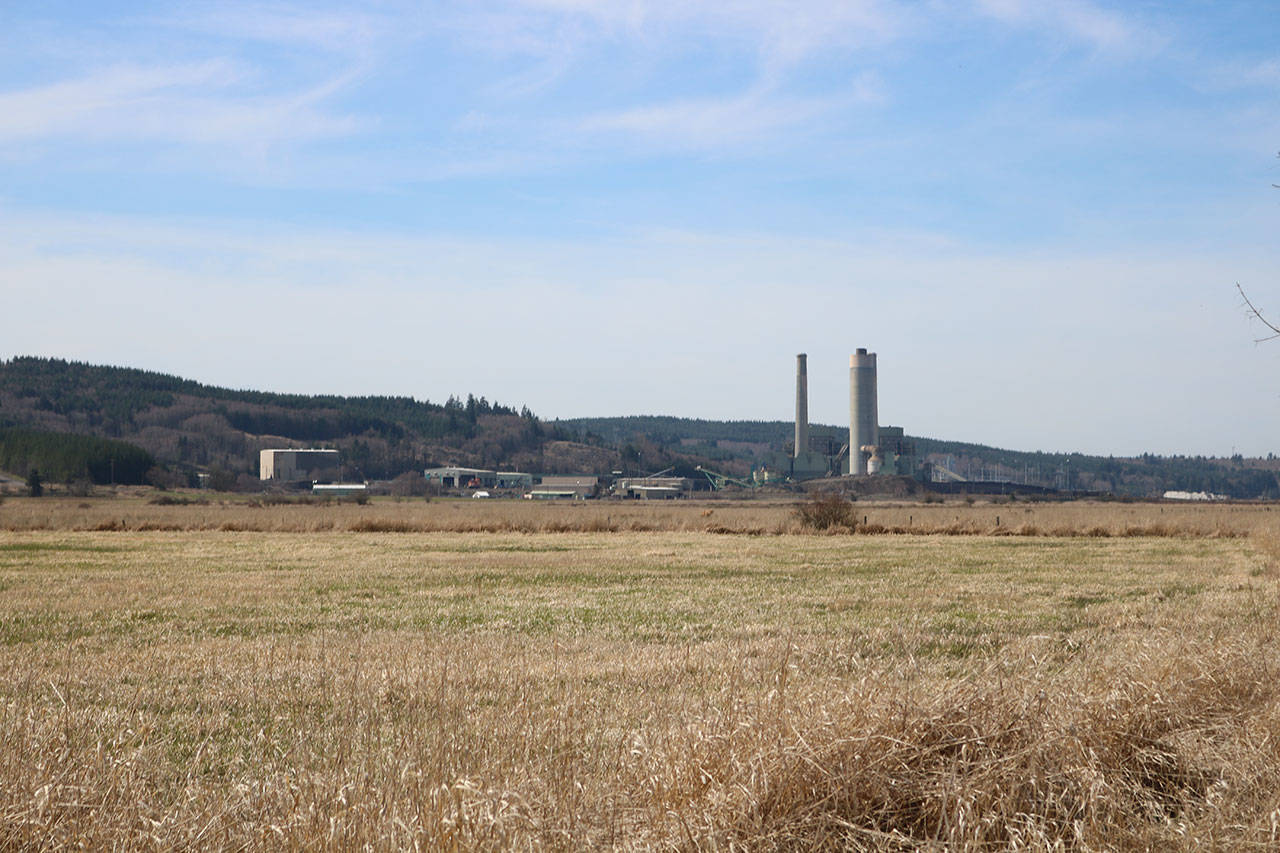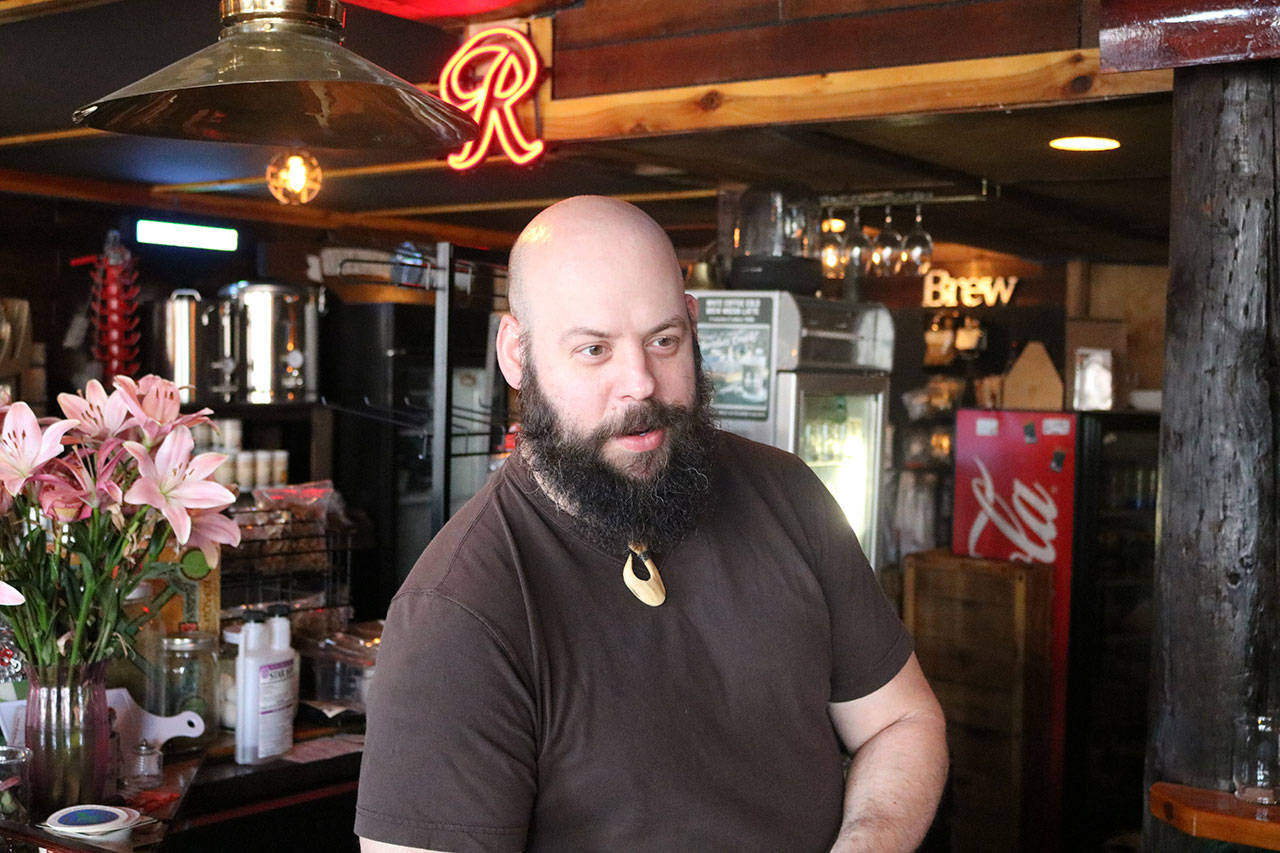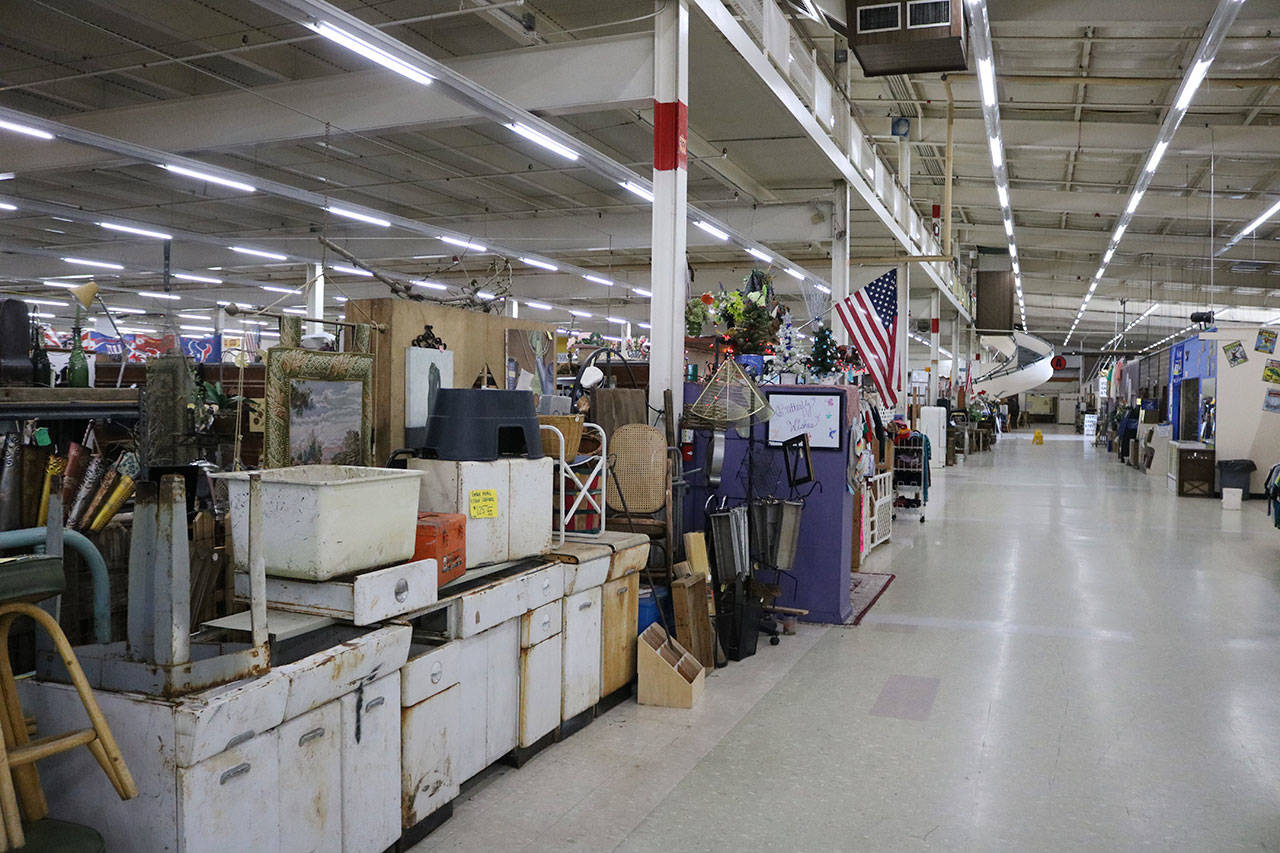On a recent sunny Monday afternoon, 82-year-old Robert Oberg is sitting inside the Yard Birds Mall in Chehalis, overseeing his second-hand DVD shop in the indoor flea market.
Vendors like him rent space here and sell merchandise. It’s the closest thing the county has to a traditional indoor mall, but the goods for sale consist heavily of odds and ends and second-hand items. For life’s necessities, there is the Walmart Supercenter, the only big-box store in Lewis County and located just on the other side of I-5.
When asked, Oberg, who has lived in the area for most of his life, recalls when the TransAlta Centralia Power Plant shuttered its local coal mine in 2006. The community took a blow, he says. Many people left following the closure of the mine, he adds, and the ones that stayed often found jobs that paid far less.
“That was one of the best-paying jobs, I guess it was,” he says. “There isn’t any jobs much here except for retail.”
He says there has been a downturn in his DVD business over the last year. There are a number of potential reasons for this, but to Oberg it is a sign of the state of the local economy.
“There’s a lot of people that just don’t have much money,” he says.
For many years, the economy in Lewis County was humming, powered by the coal that was dug from that nearby mine, and burned at the TransAlta Centralia Power Plant to create energy that was sent to manufacturers and public utilities across the region. Much of that energy has gone to Bellevue-based Puget Sound Energy, the largest power supplier in the state with more than one million customers, including everyone who plugs in a toaster on the Eastside (though it does not provide energy for Seattle).
Many, including all those Eastside residents, still rely on the coal that is burned here, but that is changing. And while the economic future remains cloudy in Lewis County, one thing is clear: That, despite President Donald Trump’s assurances that coal is on a comeback, power suppliers like PSE are moving away from the fossil fuel, and are unlikely to return to it.
As a result, government and business leaders in the region have been exploring options for a post-coal future. This week, TransAlta announced plans to create the largest solar farm in the United States, right over the county line in Lewis’ neighboring Thurston County.
According to The Chronicle in Centralia, the 1,000-acre solar farm would be capable of producing up to 180 megawatts of electricity, a fraction of the 380 megawatts of coal-fueled power that the plant currently provides PSE. The solar farm could be operational by 2020, the same year that the first of two coal boilers at the plant are scheduled to shut down.
TransAlta is currently in the permitting process to obtain a land rezone from Thurston County to begin construction, The Chronicle reported. While it would provide around 300 jobs during construction, it would result in only four permanent technician jobs.
The solar farm would then provide a short-term shot in the arm for Lewis County, which is still reeling from lingering effects of the Great Recession and the loss of industries within its borders. Beyond those short-term gains, uncertainty remains.
A SMALLER CARBON FOOTPRINT
The planned closure of the TransAlta plant has followed intense pressure on energy companies in the Pacific Northwest. With the stated interest of arresting man-made climate change, activists and government officials have pressed for these entities to eliminate the use of coal and reduce their carbon footprint.
Energy suppliers and industrialists across the state have watched as Gov. Jay Inslee has attempted to implement a carbon tax on energy sources that rely on fossil fuel. The latest effort died earlier this month in the state Legislature, but an initiative to create a carbon tax—one that is likely to be even more punishing to industry reliant on fossil fuels—is being drawn up by environmental groups for November’s ballot.
In September, PSE offices in Bellevue were stormed by activists demanding that the company stop using oil derived from fracking, stop plans to build a natural gas facility in Tacoma, and shut down the Colstrip coal power plant in Montana.
Meanwhile, the price of other sources of energy has become competitive with coal.
It’s difficult to say which pressure points are having the greatest impact on PSE, but it is responding. In December 2017, officials announced that the utility would be reducing its carbon footprint by 50 percent by 2040 while completely eliminating coal from its portfolio.
This is no small task. PSE currently sources a majority of its power from a mixture of hydroelectric, wind, and natural gas, but according to data from the PSE website, the company still gets 37 percent of its power from coal.
Much of the conversation surrounding PSE’s coal usage has been focused on the Colstrip, Mont. plant that it partially owns. In 2013, the plant provided 667 megawatts of energy. Along with co-owner Talen Energy, which provides substantial portions of its power to the East Coast, the power company agreed to shut down the Colstrip plant in 2016, stemming from a lawsuit brought by the Sierra Club and the Montana Environmental Information Center over air quality violations in 2013. Boilers 1 and 2 at the Colstrip plant are slated to shut down in 2020 with another two boilers operating at least until 2027. PSE is required to provide updates to Washington state regulators on when the last two boilers can be shuttered, but there is no final shutdown date.
Receiving less attention of late is the TransAlta plant, which sealed the fate of its coal economy in 2011, following negotiations between the state, the Sierra Club and TransAlta.
According to a 2013 Penn State study, written after the agreement, the Centralia Power Plant produced roughly 13 percent of total carbon emissions generated by the top five polluting plants in Washington. The Seattle Times reported that the plant has generated as much pollution as 1.75 million cars while generating 1,340 megawatts of electricity annually. In terms of raw volume, it was pumping 5.36 million metric tons of CO2 into the environment every year, accounting for 81 percent of emissions from the top five most polluting power plants in Washington state. The second biggest plant contributing to pollution in the state was the River Road Generation Plant in Clark County, which produced 0.39 million metric tons of CO2 in 2013.
These carbon emissions were the driving force behind the Sierra Club lawsuit that led to the agreement. As a result, the plant’s first boiler is scheduled to shut down in 2020, with the remaining boiler closing in 2025.
While this was welcome news for environmentalists in 2011, it was met with foreboding in Lewis County, which still relies on coal for at least 150 good-paying jobs. Sitting dead center between Seattle and Portland, the county is far removed from the rolling hills of West Virginia coal country where the national conversation about coal is centered, but it is a prime example of what can happen when coal winds down.
A TOUGH PILL TO SWALLOW
The impending closure of the TransAlta plant is regarded as the third part of what Lewis County Commissioner Edna Fund calls a “triple whammy.”
“It’s been a tough pill for us to swallow economically,” she says.
The first hit came with the closure of a coal mine in the rural southwest Washington county in 2006.
According to Power Technology, TransAlta cited operations costs for closing the 600-worker mine. They weren’t the only ones; according to Fortune Magazine, the nationwide coal workforce had been reduced by 40 percent in less than a decade, reaching the lowest levels of employment since 1978.
The next hit came in 2007 when a severe flood submerged whole communities throughout the county and turned sections of I-5 into a lake.
Then, as the county was recovering from those two developments, the entire country found itself in economic free fall. The resulting Great Recession led to 10 percent unemployment nationally in the months following the initial drop in 2007. Lewis County’s unemployment rate hit a high of 15.4 percent in 2009 compared with a statewide peak of 9.9 in 2010. And while coastal cities have seen much or all of their economic growth recover, rural communities like those in Lewis County have continued to lag.
So, technically, the announcement that the TransAlta plant would be closing in 2011 was a fourth whammy, one that promised the loss of jobs that paid upwards of $80,000 annually. High-paying logging jobs have been on the wane as well, with the state Employment Security Department reporting that between 2000 and 2016, logging and mining jobs in Lewis County dropped from 1,430 to 580. Those jobs are outliers in a lower-paying, largely service-based economy that already ranked 34th out of 39 counties in Washington in terms of per-capita income in 2013.
Income figures in the county vary, but the U.S. Census Bureau pegged the per-capita income in the county at $23,000, with a total population hanging around 76,000. It had a 6.7 percent unemployment rate last December, compared to 3.6 percent in King County. In 2015, 14.3 percent of the county’s population was living below the poverty level, compared to 12.2 percent statewide.
On top of the loss of high-paying jobs in a generally impoverished area, these factors have also led to a lack of public tax revenue for emergency services such as fire departments and the Lewis County Sheriff’s Office, Fund said.
The two largest school districts in the county have high rates of students on free and reduced lunch, a barometer used to approximate poverty in a community. In the Centralia School District, nearly 70 percent of students are in the program, along with 45 percent of students in Chehalis. This is compared to 34 percent of students receiving free or reduced lunches in Seattle Public Schools, around 18 percent in the Bellevue School District, and 11 percent in Lake Washington School District.
To help offset damages caused by the shutdown, $55 million in economic assistance is being provided by TransAlta, a Canadian corporation with 64 facilities in Canada, the United States, and Australia. As part of the 2011 TransAlta Energy Bill, the company agreed to pay $10 million for weatherization efforts for local businesses, nonprofits, and governments to promote energy efficiency, another $20 million for worker retraining, and $25 million to promote energy technology for projects that promote clean air, clean energy, and the environment.
Lewis County also receives additional help from the state, which has categorized the county as “distressed,” meaning the three-year unemployment rate is at least 20 percent higher than the statewide average.
According to The Chronicle, TransAlta had around 200 employees last summer. When the first boiler shuts down in 2020, there will be around 110 jobs remaining. If it is successful in an $84 million bid to transition to a natural gas plant, around 150 jobs would remain. Converting the plant will rely on market needs, TransAlta president Bob Nelson told the paper. A plan to give TransAlta a tax cut if it transitioned the plant to natural gas was vetoed by Gov. Inslee in 2017.
LOOKING TO THE FUTURE
Meanwhile, county commissioners and local chambers of commerce have been scrambling to replace jobs and attract new industry to fill the economic gap.
“We’re hopeful that we can recruit businesses to make up for them,” Fund said of mining and logging jobs.
Fund said they hope to create a highway interchange off I-5 to facilitate an industrial park near the site of the plant, and say they have received interest from potential land buyers.
Cindy Booth, the owner of Dunnies Espresso and Boutique in Yard Birds, says the community has been waiting for economic improvement to trickle down to them for a long time. She isn’t expecting it anytime soon and wasn’t optimistic that any relief would be coming from the federal level in the form of the recently passed tax cuts.
“It’s gonna take a while,” she said.
This sentiment was echoed by an antique store business owner in Centralia, who wished to remain unnamed for privacy. She said she hopes the county can attract corporations that pay decent wages.
“In my opinion, we’re still in a recession ever since it dumped,” she said. “We’ve been sitting on the bottom for a long time waiting for things to get better.”
Another antique store owner in downtown Chehalis said he used to sell new merchandise, but had to switch to second-hand items due to a lagging economy and lack of customers who could afford new products. Antique stores are a staple of downtown Centralia’s main thoroughfare.
A few miles away in the county seat, Chehalis, is Chris Rohr’s bar, Flood Valley Brewing. A tap house amongst the city’s rustic brick buildings and small streets, the business opened as a bar in late 2016. It was previously a brewing supplies store.
Rohr said both state regulations and local politicians were holding the county back, citing a decision by the county commissioners to ban marijuana agriculture unless growers could get a federal water permit. This essentially places an indefinite ban on growing legal commercial pot until federal laws change.
“(They) bring in a few more low-paying jobs, but they’re not trying to bring in industry,” he said. “It’s not like we have Microsoft.”
Rohr hopes to turn his bar—which hosts comedy nights, live music, and has a broad selection of craft beers from across the state—into a brewery to stimulate the local beer industry and become an anchor business in the city.
Rohr wants to provide good-paying jobs for his employees.
“It’s something more that may actually help people,” he said.
Talking with Lewis County residents who attribute the loss of the lumber, coal, and power industries largely to regulations, it’s easy to understand the feeling of being left behind in a state with booming industry in the Puget Sound counties only a couple hours drive to the north.
While Fund is optimistic they will be able to attract a major industry to the county by the time the coal power plant shuts down in 2025, she shied away from what could happen if they are unsuccessful.
“We’re trying to have alternative employment for people and good, family-wage jobs,” Fund said. “If we don’t have those jobs … our future doesn’t look so good.”
_______
A version of this story first appeared in the Bellevue Reporter.













